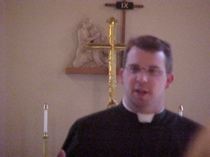The Failure of the Anglican Experiment...?
Greetings again to all,
What I am about to write is going to seem traitorous and disloyal. It may infuriate some. In fact, I feel horrible for even thinking what I am thinking but that's the way it is.
Are we witnessing the failure of the Anglican Experiment?
What I mean by that is historic Anglicanism's committment to a non-papal, scriptural and conciliar Catholicism without a strong central authority. Are we discovering that this vision is untenable and unworkable in our time?
Before I go on, let me say that I am committed to the Anglican Way. I am committed to the Anglican liturgy and to the spirituality and pastoral vision of the English tradition. But can we really exist as a truly Catholic church with no centralized authority whatsover? I don't mean we all just need to become RCs and accept Papal authority as it stands now. But isn't there something in all of us that looks for authority...tangible, human authority?
Think about it. Everybody has a "pope." In other words, everyone has an authority that they look to for a final and authoritative word on matters of great importance. For many Anglo-Catholics, it is the Holy Father himself. For revisionists, it's Spong or Griswold. For many faithful Anglicans, it's Akinola. For '28 BCP folks it's Peter Toon. There seems to be a primal consciousness of the need for authority; central, final authority. Of course we believe Jesus Christ is the ultimate authority, and for Anglicans, that Scripture is the supreme authority in matters of faith and practice. But who mediates that authority to us? That is the question at hand.
The Windsor Report seems to want to give a greater role to the Archbishop of Canterbury. And while it is certainly a small step, it is indeed a step toward more centralized authority. Anglicanism for years has been trying to cope with the lack of central authority by coming up with various "instruments of unity." In the midst of all of this, we have qualified every statement that has come from these instruments as non-binding and advisory. But are we realizing now that our experiment of Catholicism without central authority has simply failed? I shudder to think.
The Windsor Report is a fine piece of theology, to be sure. It presents us with a vision of being in Communion by way of loving interdependence and autonomy-in-relationship. It holds us accountable to the bonds of love and affection which hold us together. But is it too generous to human nature to assume that we will not inevitably push through our own agendas, citing "autonomy" and "differing contexts" as a pretense for our lack of desire to submit ourselves to the good of the Communion? I think perhaps.
In the end, who will come down as the final word and "tell 'em no" when a body wants to push something through that is patently contrary to the Faith? All bishops in our Church are called to guard the faith and unity of the Church. But who decides what that faith is? Every bishop in the Church claims to be fulfilling ordination vows, but if that is the case, how come there are almost as many "faiths" as there are dioceses?
Perhaps the Anglican Experiment as we know it has simply failed. Where we go from here, I have no clue, only God does. I believe in the Lord's promise that the gates of Hell will not prevail over His Church. But I fear that "business as usual" is about to change dramatically.
I'd appreciate some more thoughts on this...
Pax Vobiscum,
RED+

